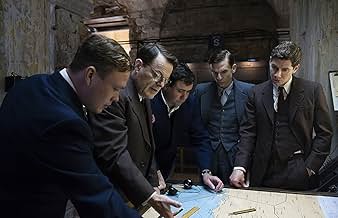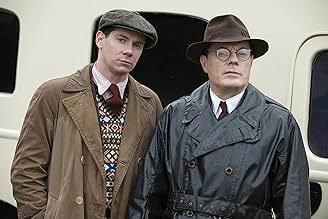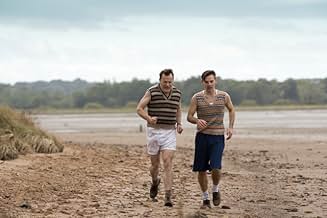AVALIAÇÃO DA IMDb
6,8/10
1,3 mil
SUA AVALIAÇÃO
Adicionar um enredo no seu idiomaEddie Izzard stars in this funny, moving and inspiring factual drama about the pioneering work on radar by a little known team of scientists in the run up to the Second World War.Eddie Izzard stars in this funny, moving and inspiring factual drama about the pioneering work on radar by a little known team of scientists in the run up to the Second World War.Eddie Izzard stars in this funny, moving and inspiring factual drama about the pioneering work on radar by a little known team of scientists in the run up to the Second World War.
- Prêmios
- 2 indicações no total
Neal Stewart-Roxburgh
- The 7th Boffin
- (não creditado)
Avaliações em destaque
A local theatre has been showing little-known WW II films this month (August 2015) on the 70th anniversary of the end of that war, and this film on the British development of radar for the RAF prior to WW II was one of them. I'm interested in the historical development of technology plus I had seen a PBS Nova show several years ago on WW II's spur to radar's development, so I was interested in this BBC production. In addition, Ian Kershaw, a well-respected British historian, wrote the script. I was not disappointed; it was a very enjoyable film for me.
I had also seen earlier this year "The Imitation Game" featuring Alan Turing and his team of British mathematicians and codebreakers at Bletchley Park, and the parallels with "Castles" are striking. Both films have groups of unconventional geniuses monitored by class-conscious representatives of Britain's ruling circles and sequestered in rural hideaways where they work under great pressure to help win the war ("Imitation") or prepare for war ("Castles"). Robert Watson Watt, played by Eddie Izzard, is the Alan Turing of "Castles", and although not as eccentric as Turing, is sufficiently unconventional to warrant suspicion and doubt by those in the British government in the late-30s who must trust him with their scarce resources. His idea is to use a series of radio beams: (1) of sufficient strength to echo off incoming objects, e.g., bombers, at a sufficient distance, (2) and of sufficient number to ascertain their direction. The senior officials want him to use the nation's top physicists from Oxford and Cambridge to assist him, but Watt is an engineer for the Meteorological Service and wants to use his fellow "weather engineers" who can think outside-the-box. He gets his way against the rigid class structure of pre-war Britain, and for my money the visible drama of demonstrating radar's efficacy in detecting planes from 60 miles out (as shown in "Castles") is more striking than the drama that unfolds in "Imitation" where the group is finally able to read a coded message. The end of "Castles" shows how well radar has been integrated into RAF's Fighter Command by taking us inside their command centers that are ready to scramble fighters at the first ping on the radarscope on the eve of the Battle of Britain (when the Luftwaffe had three times as many planes at the outset).
Modern wars, for better or worse, are said to be won with economic production and technology, and it's thus gratifying to see little-known figures like Watt featured in a film like this. It's sad to compare, however, that Watt was rewarded with a knighthood in 1942 for his pre-war development of radar, while Turing, pledged to secrecy by the British government for his war-time codebreaking, was not honored during his lifetime and apparently committed suicide.
I had also seen earlier this year "The Imitation Game" featuring Alan Turing and his team of British mathematicians and codebreakers at Bletchley Park, and the parallels with "Castles" are striking. Both films have groups of unconventional geniuses monitored by class-conscious representatives of Britain's ruling circles and sequestered in rural hideaways where they work under great pressure to help win the war ("Imitation") or prepare for war ("Castles"). Robert Watson Watt, played by Eddie Izzard, is the Alan Turing of "Castles", and although not as eccentric as Turing, is sufficiently unconventional to warrant suspicion and doubt by those in the British government in the late-30s who must trust him with their scarce resources. His idea is to use a series of radio beams: (1) of sufficient strength to echo off incoming objects, e.g., bombers, at a sufficient distance, (2) and of sufficient number to ascertain their direction. The senior officials want him to use the nation's top physicists from Oxford and Cambridge to assist him, but Watt is an engineer for the Meteorological Service and wants to use his fellow "weather engineers" who can think outside-the-box. He gets his way against the rigid class structure of pre-war Britain, and for my money the visible drama of demonstrating radar's efficacy in detecting planes from 60 miles out (as shown in "Castles") is more striking than the drama that unfolds in "Imitation" where the group is finally able to read a coded message. The end of "Castles" shows how well radar has been integrated into RAF's Fighter Command by taking us inside their command centers that are ready to scramble fighters at the first ping on the radarscope on the eve of the Battle of Britain (when the Luftwaffe had three times as many planes at the outset).
Modern wars, for better or worse, are said to be won with economic production and technology, and it's thus gratifying to see little-known figures like Watt featured in a film like this. It's sad to compare, however, that Watt was rewarded with a knighthood in 1942 for his pre-war development of radar, while Turing, pledged to secrecy by the British government for his war-time codebreaking, was not honored during his lifetime and apparently committed suicide.
Eddie Izzard seemed like a curios choice, at first, but he does a terrific job in this movie. It proves to be a great lesson in the importance of achievements from the farthest corners of Britain during WWII.
What could have been a fascinating tale turns out, regrettably, to be a pile of slush. Fine cast can't overcome a weak script by the brilliant historian Ian Kershaw. Not only does he fail to create rounded believable characters, but he is unable to capture a substantive explanation for how the men are developing their theories. All reduced to blackboard scribbles. It's not an easy thing to present complex science to a credible plot for lay viewers, but Kershaw's version collapses into the simplistic and flat. It just leaves the film empty. If you want to see a great film on a war-time pressure cooker for inventors try The Dam Busters (1955), directed by Michael Anderson. Another absolutely brilliant one about scientific war time geeks is The Small Back Room (1948) by the startling, inventive and fun duo Michael Powell and Emeric Pressburger. They nail all the quirky Britishisms and get the romance right too. Kershaw might've taken a few tips from these tremendous scripts and films.
In 5 years, this is only the second review that I have done on IMDb. The reason for this review is that there were only 4 other user reviews and this movie deserves much more so here I am writing a review. I started off watching by myself and a few minutes into the movie my son joined me. My son is an action movie buff and will usually leave the room if it isn't action so I was surprised to find him still there at the end of 'Castles In the Sky'. Not only was he still there, he initiated a discussion about the movie with respect to his new-found know knowledge of just how important radar was in helping Britain win the second world war. This movie was also very inspiring since Robert Watts developed radar in the face of adversity and very much to his credit, he was able to overcome many obstacles while under immense pressure. I know that myself and my son left this movie with a 'can- do' attitude. The acting was superb and even though it was a dark time for England, there was some light-hearted scenes which were thoroughly enjoyed by both of us. I can absolutely state that this movie is a good movie that I would highly recommend to others.
The story of Robert Watson Watt, a pioneer, who helped enormously in Britain's war effort.
I liked the humour, feel and spirit of it, it was a light hearted take, on what's quite a serious story, I'm not sure about how much of it was historically accurate, but the story itself is fascinating, and if you're interested in this piece of history, it's worth reading up.
Some nice touches of humour, the scenes on the beach were food fun, such a contrast to the authentic footage of the Nazis, chilling still to watch.
A wonderful cast assembled here, Eddie Izzard and Julian Rhind Tutt were both great, Tim McInnery, great actor, but not the right fit for Churchill.
It's worth seeing, 7/10.
I liked the humour, feel and spirit of it, it was a light hearted take, on what's quite a serious story, I'm not sure about how much of it was historically accurate, but the story itself is fascinating, and if you're interested in this piece of history, it's worth reading up.
Some nice touches of humour, the scenes on the beach were food fun, such a contrast to the authentic footage of the Nazis, chilling still to watch.
A wonderful cast assembled here, Eddie Izzard and Julian Rhind Tutt were both great, Tim McInnery, great actor, but not the right fit for Churchill.
It's worth seeing, 7/10.
Você sabia?
- Erros de gravaçãoThe aircraft in the initial test is of the right era but the wrong type - it looks like a de Havilland Rapide, while it should be a Handley Page Heyford, something in which the film makers had little choice, since not a single example of a Heyford survives, flying or not.
- ConexõesReferenced in Six Minutes to Midnight: Behind the Scenes (2020)
Principais escolhas
Faça login para avaliar e ver a lista de recomendações personalizadas
Detalhes
- Data de lançamento
- País de origem
- Idioma
- Locações de filme
- Hedderwick, Dunbar, East Lothian, Escócia, Reino Unido(Cricket match in the mud)
- Empresas de produção
- Consulte mais créditos da empresa na IMDbPro
- Tempo de duração1 hora 30 minutos
- Cor
Contribua para esta página
Sugerir uma alteração ou adicionar conteúdo ausente






























